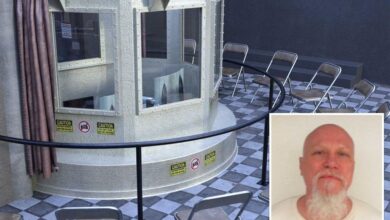New Yorkers fighting against massive battery storage plants find new ally in EPA chief Lee Zeldin

New Yorkers fighting the opening of massive battery energy plants in their neighborhoods have a powerful new ally: US Environmental Protection Administrator Lee Zeldin.
Zeldin, the former Long Island congressman, will be holding a press conference in Hauppauge Monday to discuss environmental safety issues posed by “Battery Energy Storage Systems,” which are hazardous when they catch fire.
While not explicitly opposing BESS, Zeldin is set to issue a new EPA guidance for communities and local governments to consider regarding the environmental risks of such facilities.
“Calling a technology ‘green energy’ does not mean there are no environmental impacts,” Zeldin, the 2022 Republican candidate for governor, told The Post.
He blasted the “delusional” and unrealistic green energy goals advanced by Gov. Kathy Hochul and Albany Democrats amid the backlash against the proliferation of battery storage plants across New York, including Staten Island, Queens, the Hudson Valley and upstate.
“Residents are looking across the country where dangerous lithium battery fires at BESS facilities have caused widespread damage, and they are concerned with New York’s partisan push to fill yet another of its delusional ‘green’ goals, which the state itself admits it cannot meet,” Zeldin said.
“Many New Yorkers, especially in New York City and on Long Island, have made their voices clear – they do not want Battery Energy Storage Systems built in their neighborhoods.”
The Empire State is aggressively expanding battery energy storage systems to meet ambitious goals
to reduce greenhouse gas emissions by 40% by 2030 and achieve 100% zero-carbon emission electricity by 2040 under the the Climate Leadership and Community Protection Act of 2019.
Zeldin slammed what he deemed wacky state Democrat policies that move to limit or phase out more reliable energy sources such as natural gas to advance their climate protection agenda.
“The state that banned the safe extraction of natural gas, gas hook-ups on new construction, gas stoves, and aims to end the sale of gas-powered vehicles, continues to put the safety and well-being of New Yorkers second to their climate change agenda,” Zeldin said.
He cited recent incidents in California and Hawaii to demonstrate the serious risks BESS facilities pose to host communities and first responders.
A rep for Hochul said it was bizarre to have the nation’s environmental chief opposing the advancement of clean energy programs that reduce carbon emissions to tackle climate change, aiming to improve the environment while diversifying New York’s power supply.
“Lee Zeldin’s job is to protect the environment, but he has been doing anything but that,” said Ken Lovett, Senior Hochul’s communications advisor on energy and the environment.
“His continued assault on clean energy and his push for rollbacks on environmental protections will hurt everyone in his home state of New York and across the country and fly in the face of the federal government’s claim of wanting U.S. energy independence,” Lovett said of Zeldin.
“While other states are rapidly investing in storage to stabilize their grids and lower costs, Zeldin’s approach risks leaving New York’s economy behind and forcing New Yorkers to pay,” he said.
New York recently enacted among the most stringent battery energy storage regulations in the country in 2023 pertaining to safely developing energy storage facilities, Hochul’s office said.
Six former city fire safety officials, including former FDNY Commissioner Tom Von Essen, praised the regulations.
Since 2019, New York has approved more than 6,000 battery storage projects creating 440 megawatts of capacity, with 1.3 gigawatts already under contract and a state goal of six gigawatts by 2030, according to the EPA.
New York passed two laws that dramatically expanded the state government’s power to override local opposition for major renewable projects, including battery storage facilities of 25 megawatts or larger.
The Hauppauge facility is not subject to a state override, but residents there have expressed widespread misgivings.
Concerns include potential toxic emissions released during a blaze as well as contaminated water containing hydrofluoric acid and other pollutants being discharged into the Nissequogue River and groundwater while fighting a fire at the facility.
Credit to Nypost AND Peoples



